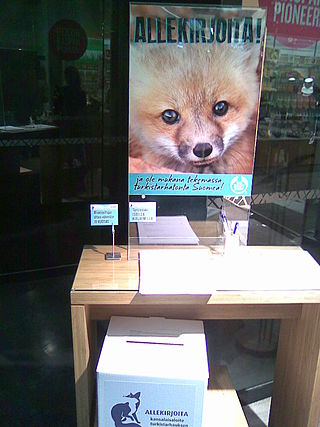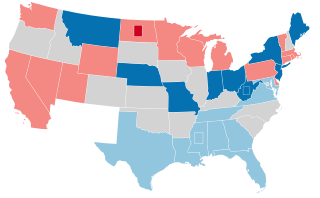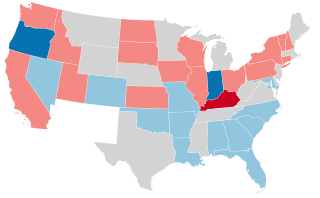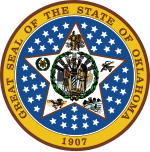
The Seventeenth Amendment to the United States Constitution established the direct election of United States senators in each state. The amendment supersedes Article I, Section 3, Clauses 1 and 2 of the Constitution, under which senators were elected by state legislatures. It also alters the procedure for filling vacancies in the Senate, allowing for state legislatures to permit their governors to make temporary appointments until a special election can be held.

In political science, an initiative is a means by which a petition signed by a certain number of registered voters can force a government to choose either to enact a law or hold a public vote in the legislature in what is called indirect initiative, or under direct initiative, where the proposition is put to a plebiscite or referendum, in what is called a Popular initiated Referendum or citizen-initiated referendum.
In the politics of the United States, the process of initiatives and referendums allow citizens of many U.S. states to place new legislation, or to place legislation that has recently been passed by a legislature on a ballot for a popular vote. Initiatives and referendums, along with recall elections and popular primary elections, are signature reforms of the Progressive Era; they are written into several state constitutions, particularly in the West. It is a form of direct democracy.

Proposition 60 was an amendment of the Constitution of California, enacted in 2004, guaranteeing the right of a party participating in a primary election to also participate in the general election that follows. It was proposed by the California Legislature and approved by the voters in referendum held as part of the November 2004 election, by a majority of 67%.

The Legislature of the State of Oklahoma is the state legislative branch of the U.S. state of Oklahoma. The Oklahoma House of Representatives and Oklahoma Senate are the two houses that make up the bicameral state legislature. There are 101 state representatives, each serving a two-year term, and 48 state senators, who serve four-year terms that are staggered so only half of the Oklahoma Senate districts are eligible in each election cycle. Legislators are elected directly by the people from single member districts of equal population. The Oklahoma Legislature meets annually in the Oklahoma State Capitol in Oklahoma City.

The 1910–11 United States Senate election were held on various dates in various states. As these U.S. Senate elections were prior to the ratification of the Seventeenth Amendment in 1913, senators were primarily chosen by state legislatures. Senators were elected over a wide range of time throughout 1910 and 1911, and a seat may have been filled months late or remained vacant due to legislative deadlock. However, some states had already begun direct elections during this time. Oregon pioneered direct election and experimented with different measures over several years until it succeeded in 1907. Soon after, Nebraska followed suit and laid the foundation for other states to adopt measures reflecting the people's will. By 1912, as many as 29 states elected senators either as nominees of their party's primary or in conjunction with a general election.

The 1908–09 United States Senate elections were held on various dates in various states. As these U.S. Senate elections were prior to the ratification of the Seventeenth Amendment in 1913, senators were primarily chosen by state legislatures. Senators were elected over a wide range of time throughout 1906 and 1907, and a seat may have been filled months late or remained vacant due to legislative deadlock. However, some states had already begun direct elections during this time. Oregon pioneered direct election and experimented with different measures over several years until it succeeded in 1907. Soon after, Nebraska followed suit and laid the foundation for other states to adopt measures reflecting the people's will. By 1912, as many as 29 states elected senators either as nominees of their party's primary or in conjunction with a general election.

The Oklahoma House of Representatives is the lower house of the legislature of the U.S. state of Oklahoma. Its members introduce and vote on bills and resolutions, provide legislative oversight for state agencies, and help to craft the state's budget. The upper house of the Oklahoma Legislature is the Oklahoma Senate.

Proposition 1F of 2009 was a measure approved by California voters relating to the salaries of state officers. It was an amendment of the Constitution of California prohibiting pay raises for members of the State Legislature, the Governor, and other state officials during deficit years. It was proposed by the legislature and approved in a referendum held as part of the May 19, 2009 special election ballot, in which the California electorate also voted on five other propositions.

The 1906–07 United States Senate elections were held on various dates in various states. As these U.S. Senate elections were prior to the ratification of the Seventeenth Amendment in 1913, senators were chosen by state legislatures. Senators were elected over a wide range of time throughout 1906 and 1907, and a seat may have been filled months late or remained vacant due to legislative deadlock. In these elections, terms were up for the senators in Class 2.

The First Oklahoma Legislature was the first meeting of the legislative branch of the government of Oklahoma, composed of the Oklahoma Senate and the Oklahoma House of Representatives. The meeting took place from December 2, 1907, to May 26, 1908, in the Guthrie City Hall Building during the first year of the only term of Governor Charles Haskell.
The 25th Arizona Territorial Legislative Assembly was the final session of the Arizona Territorial Legislature. The session convened in Phoenix, Arizona, and ran from January 18 till March 18, 1909. Its actions include the creation of Greenlee County, establishing the Arizona Pioneers' Home, and requiring primary elections.

The 2018 general election was held in the U.S. state of Oklahoma on November 6, 2018. All of Oklahoma's executive officers were up for election as well as the state's five seats in the United States House of Representatives, half of the 48 seats in the Oklahoma Senate and all 101 seats in the Oklahoma House, and five offices in each of Oklahoma's 77 counties. Voter turnout was 42.5% of the eligible population, a 12.6% increase over the 2014 midterms but still the third lowest in the nation.

The 1911 United States Senate election in New Jersey was held on January 24–25, 1911. Republican incumbent John Kean did not run for re-election to a third term. The open seat was won by Democrat James Edgar Martine with Republican former Governor Edward C. Stokes as the runner-up.

John Herbert Carkin was an American politician, attorney, public service executive, and banker from the state of Oregon. He was a Republican who served nine years in the Oregon House of Representatives, where he represented a district in southern Oregon. He served as Speaker of the Oregon House of Representatives during the 1927 legislative session, elected by a unanimous vote of House members. Later, he served as chairman of the Oregon Tax Commission and was Oregon's Public Utility Commissioner before becoming president of a savings and loan association in Salem, Oregon.

Samuel Hopkins Nichols was a politician and civic leader in the states of Minnesota and Washington. He was a pioneer of Salem Township and Fergus Falls in Minnesota as well as of Everett, Washington. He was a Clerk in Salem Township and president of the Fergus Falls City Council, served as County Commissioner for Olmsted County, Minnesota, Assistant Clerk and Chief Clerk for the Minnesota House of Representatives, and Clerk of the state Supreme Court. In Everett, Nichols helped incorporate the city's first Chamber of Commerce and was a member of its first City Council. He was elected the fourth Secretary of State of Washington in 1901 and re-elected twice. He served at the position two full terms, but had to resign in the beginning of his third term due to accusations of malfeasance and corruption.

The 1903 Iowa State Senate elections were the last state legislative general elections held on an odd-numbered year. Iowa voters elected state senators in 29 of the state senate's 50 districts. State senators traditionally serve four-year terms in the Iowa State Senate. However, under the Biennial Elections law enacted in 1904 by the Iowa General Assembly, the senators elected in 1903 served an additional fifth year to accommodate the transition to holding elections on even-numbered years.

The Fifty-Eighth Wisconsin Legislature convened from January 12, 1927, to August 13, 1927, in regular session, and reconvened in two special sessions in 1928.
















